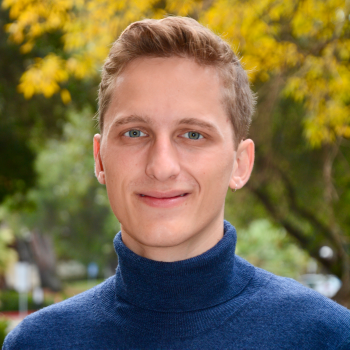Graduating CDDRL Honors Students Recognized for Outstanding Theses
Graduating CDDRL Honors Students Recognized for Outstanding Theses
Adrian Scheibler ('22) is a recipient of the 2022 Firestone Medal and Michal Skreta ('22) has won the CDDRL Outstanding Thesis Award.

The Center on Democracy, Development and the Rule of Law proudly congratulates its graduating class of honors students for their outstanding original research conducted under CDDRL's Fisher Family Honors Program. Among those graduating are Adrian Scheibler, who has won a Firestone Medal for his thesis on regionalism and economic crisis in Europe, and Michal Skreta, winner of the CDDRL Outstanding Thesis Award for his study of the Family 500 cash benefit program in Poland.

The Firestone Medal for Excellence in Undergraduate Research recognizes Stanford's top ten percent of honors theses in social science, science, and engineering among the graduating senior class. Scheibler's thesis is entitled Challenging the State: Western European Regionalism in the Era of Financial Crisis. Using an original dataset containing 8 countries, 35 regions, and 128 regionalist parties, he finds that voters did not increase their support for regionalist parties during the crisis and may have even turned their backs on these political actors. In addition, he considers the reactions of regionalist parties in three Spanish autonomous communities, Catalonia, the Basque Country, and Galicia, to the crisis. He finds evidence of regionalist mobilization on the issue and even some indications of radicalization of regionalist demands. Taken together, he notes, these findings raise interesting implications for the impacts of the financial crisis and the interaction between economic indicators, party competition, and voting patterns.

Skreta's thesis is entitled Babies, Money, and Power: Estimating Causal Effects of the “Family 500+” Child Benefit Program in Poland using the Synthetic Control Method. He proposes using the synthetic control method as a causal identification strategy to empirically estimate country-level treatment effects of the program on fertility, poverty, and inequality. Treating 500+ as a natural experiment, he compares observational data from actual Poland with a synthetic counterfactual of Poland constructed from a weighted donor pool of other European countries through a data-driven selection procedure. His findings on fertility metrics are consistent with prior studies, being ambiguous and insignificant, indicating that the main short-term objective of the program has not been achieved. Meanwhile, he finds that the program causally reduced the rate of people at risk of poverty in Poland and that the child benefit has led to a significant reduction in income inequality.
Scheibler and Skreta are part of a cohort of ten graduating CDDRL honors students who have spent the past year working in consultation with CDDRL-affiliated faculty members and attending honors research workshops to develop their theses projects. Collectively, their topics documented some of the most pressing issues impacting democracy today in the US, India, Mexico, and Spain, among others.
"We are very proud of the CDDRL honors class of 2022," shared Didi Kuo, Senior Research Scholar and Associate Director for Research at CDDRL. "These students began their thesis projects remotely and were able to conduct research on important topics while also managing their return to campus and ongoing COVID disruptions. Their diverse intellectual backgrounds and thesis subjects reflect the talents and passions of our honors students."
CDDRL's Fisher Family Honors Program trains students from any academic department at Stanford to prepare them to write a policy-relevant research thesis with global impact on a subject touching on democracy, development, and the rule of law. Honors students participate in research methods workshops, attend honors college in Washington, D.C., connect to the CDDRL research community, and write their thesis in close consultation with a faculty advisor to graduate with a certificate of honors in democracy, development, and the rule of law.
A list of the 2022 graduating class of CDDRL honors students, their thesis advisors, and thesis titles can be found here.
CDDRL Honors Class of 2022 Thesis Presentations























